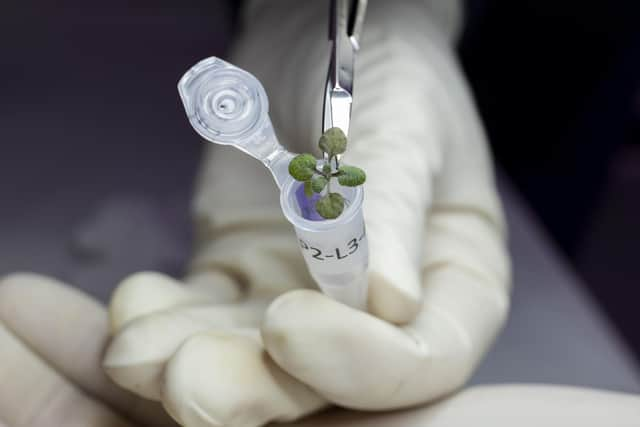Scientists grow plants in soil from moon for the first time
The milestone in lunar and space exploration is a first step towards one day growing plants for food and oxygen on the moon or during space missions.
In the new study University of Florida researchers showed the arabidopsis plant – thale cress – can successfully sprout and grow in soil that was collected from the Apollo 11, 12 and 17 missions.
Advertisement
Hide AdAdvertisement
Hide AdTheir study also investigated how plants respond biologically to the moon’s soil, which is radically different from soil found on Earth.


The research comes as the Artemis Program plans to return humans to the moon.
Rob Ferl, one of the study’s authors and a professor of horticultural sciences in the UF Institute of Food and Agricultural Sciences (UF/IFAS), said: “Showing that plants will grow in lunar soil is actually a huge step in that direction of being able to establish ourselves in lunar colonies.”
He said it was also important to show lunar soils were not harmful to terrestrial life, and also that terrestrial life could establish itself.
But what do the findings mean in relation to growing food fit for human consumption on the moon?
Anna-Lisa Paul, one of the study’s authors and a research professor of horticultural sciences in UF/IFAS, explained: “So the plants that were responding the most strongly to what we would call oxidative stress responses, those are the ones especially in the Apollo 11 samples, they are the ones that turned purple.
“And that’s the same thing that’s in blueberries and cranberries, and all of those, those dark red and purple fruits that are healthy for humans because of their anti-oxidative properties.
“We definitely don’t know the nutritive value of these plants, but it is likely not to pose any threat to humans – it’s hard to say, but it’s more likely that the chemicals that plants produce in response to stresses are ones that also help human stresses as well.
Advertisement
Hide AdAdvertisement
Hide Ad“So it’s likely to be a more benign or helpful response than the other way around.”
Dr Paul said while arabidopsis was edible, it was not tasty.
It belongs to the same family as mustard, cauliflower and broccoli, so many of the things learned could translate into the same kind of metabolic strategies and processes “that our good friend broccoli uses”, Dr Paul said.
The researchers set about planting seeds in lunar soil, adding water, nutrients and light, and analysing the growth and results.
Comments
Want to join the conversation? Please or to comment on this article.